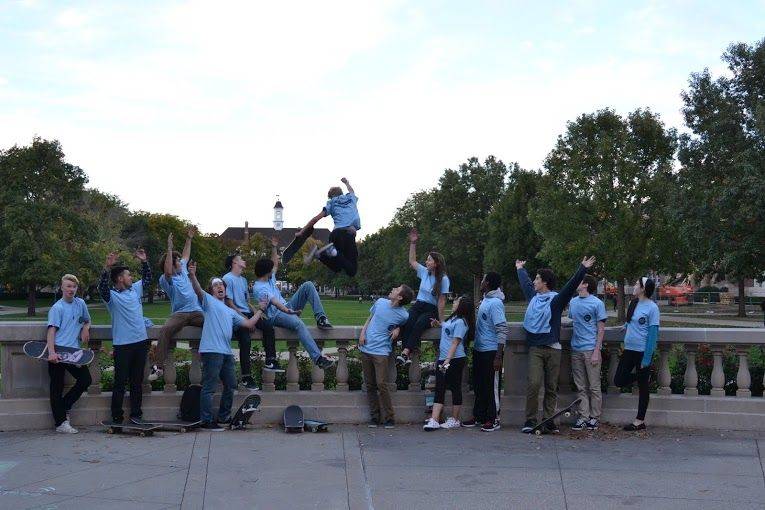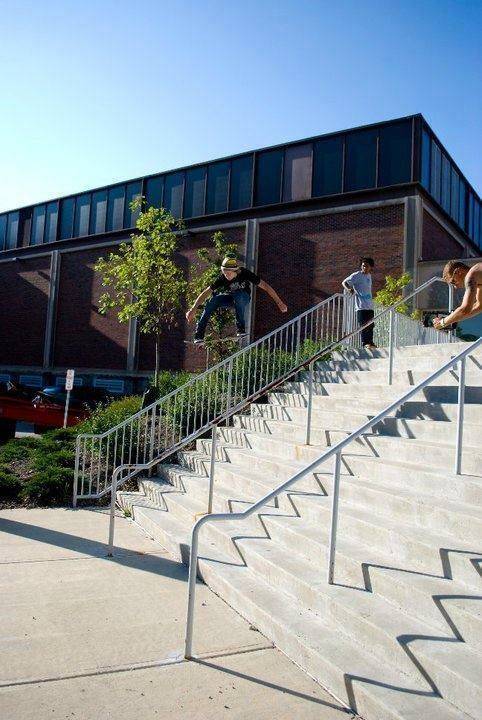The deafening sound of wheels over pavement, the dynamic, rolling perspective of an urban landscape, the delicate interplay between the self and the ‘concrete jungle’ that surrounds us. These elements come to define a skateboarder’s conception of his craft and the way he interacts with the modern world. Whereas most of us see that world as a collection of impersonal, (oftentimes) angular objects, one group in particular views it in a different light, and for a different purpose. Skateboarders the world round are unabashed by the look or feel of concrete.
They seem inspired by every set of stairs, every ledge and rail that offers them an opportunity to undertake their craft. As a sport, there are no rules, no teams to represent; as an art skating is limited only by one’s own creative imagination. It is a highly intimate venture into the nature of self-expression, and some would say self-betterment.

Nevertheless, skateboarding is shaped by – and benefits tremendously from – a community where knowledge is shared, events are organized, and culture made. With the bad rep skaters have gotten over the last half-century, not to mention the illegality of the sport, the skating community has remained relatively close-knit and separate from the rest of society. Yet skateboarding’s status as a counter culture movement has largely dissipated in recent years — big competitions and endorsements by energy drink companies have commercialized the sport, growing it to over 15,000,000 practitioners in the US alone. Skateboarding has undoubtedly weaved itself into the cultural fabric of our time, evidenced by the stardom of its athletes, and its adoption from city, to town, to college campuses nationwide.
Since August of last year, students at the University of Illinois have established a skateboarding community of their own, growing the “Illinois Skateboarding Society” to over 200 members in 11 months. Formerly a group of friends with little more than a title and a passion for skateboarding, the ISS is a University RSO that now boasts a multidisciplinary executive team, endorsement by Red Bull, and an ambitious vision for the future of skateboarding in Urbana-Champaign.

I sat down with Kristopher Long, a lifelong skateboarder and current ISS President. “Skateboarding is a unique sport”, he says. “There are no teams or rules. [It’s] simply an expression of creativity. ISS’s mission is to shape a creative environment that brings skaters together.” He describes the early days of the club as unorganized, lacking vision: “At first, we weren’t too sure what we wanted to accomplish as an RSO. We had so many ideas from the start that it was hard to focus on just one or two.” But after hosting public events to attract members, it became evident that the ISS would have to address the legal issues surrounding the sport.
According to the student handbook, skateboarding is illegal on campus. Of course, considering the legality of skating requires an understanding of the physical risks it poses, to both practitioner and property. It’s necessary in conceptualizing skateboarding for what it is — dangerous. But Long thinks that detracts people from seeing the “creative and liberating aspects of the sport”. The physical injuries incurred through skateboarding are an inevitable part of what skaters face willingly as they progress, as with most sports. What distinguishes skating from the rest is the damage to public and private property that accumulates over time, and the risk it poses to passers-by.
The ISS thus sees priority no. 1 as creating a legal skateboarding area on campus that is accessible “to everyone in the UIUC community.” Since early last fall, ISS began networking and collaborating with other university skateboarding organizations. “We saw what other schools were doing, and we knew that we could make a similar impact at our school”, Kris says, “and that’s when we started distributing surveys and petitioning for a skate park on campus.” Members of the ISS executive team have begun talks with campus representatives, administrative members of the Campus Recreation Centers (ARC&CRCE), and the mayor of Champaign. Certainly playing into skateboarding’s uncanny willingness and ability to accept new members, the ISS seems legitimately driven by the need to inspire a shared vision of what skateboarding can do for all people, on all levels.
When asked about the future of ISS, Long seems hopeful: “I see ISS becoming bigger and better than we are today. With a potential skate park on campus, ISS will hopefully attract new people to the skateboarding culture.” Long recognizes the negative connotations that go along with skaters and skateboarding, and would like to “see these stigmas shift in a positive direction.” With the group’s impressive track record in its first year, suffice it to say the Illinois Skateboarding Society has come a long way, a feat Long says the ISS owes to its members “being proactive”, and “maintaining a positive outlook”. Some of the credit is deservedly owed to the skateboards that led them to this point.








